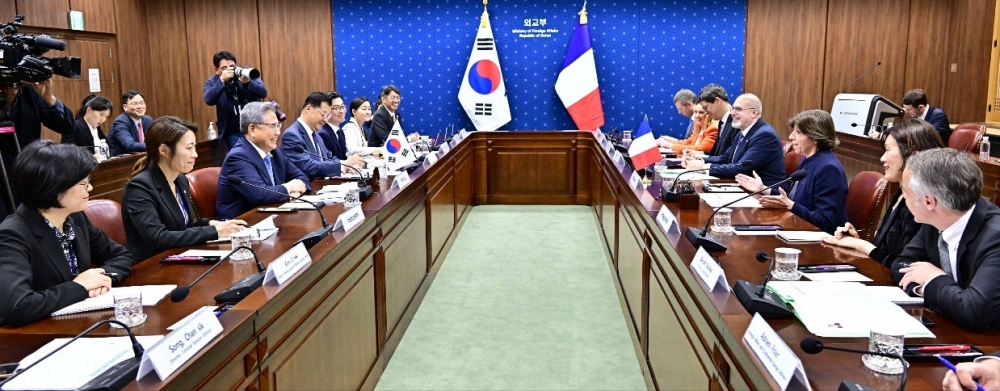-
About the Ministry
About the Ministry
- Press
- Countries & Regions
- Policy Information
- Life In Korea
Ministry News
- Notices
- Ministry News
- Press Releases
- Press Briefings
- Speeches & Published Materials
- Newsletter Service
- Diplomatic White Paper
Joint Press Release on the 4th ROK-France Foreign Ministerial Strategic Dialogue
- Date
- 2023-04-17
- hit
- 12115

1. Foreign Minister Park Jin and Foreign Minister Catherine Colonna held the 4th ROK-France Foreign Ministerial Strategic Dialogue in Seoul on April 14th. The Ministers had in-depth discussions on the overall bilateral relationship, the potential for cooperation in the Indo-Pacific region, and a range of regional and global issues.
2. The Ministers reaffirmed their will to further strengthen the Korea-France Comprehensive Partnership for the 21st Century between the two Governments through active high-level exchanges and concrete projects for cooperation, particularly in the fields of civil nuclear energy, space, renewable energy, digital technology, aeronautics and low-carbon mobility. They also welcomed the signing of the Protocol Amending the Agreement on the mobility of business people and trainees, which will be a valuable basis for further promoting economic and people-to-people exchanges between the two countries.
3. The Ministers noted that this year marks the 70th anniversary of the armistice of the Korean War, in which Korean and French Forces fought for freedom and peace on the Korean Peninsula. They expressed their satisfaction that close cooperation has been taking place in the field of defense and security including the Defense Strategy Dialogue.
4. The Ministers agreed, amidst the increasing importance of economic security, to strengthen cooperation in enhancing supply chain resilience and enhancing technological competitiveness. They also shared the view that shared efforts between the public and private sectors should continue to be enhanced in future strategic industries such as nuclear power, space, and information technology.
5. The Ministers recognized that their respective Indo-Pacific strategies share the values of freedom, democracy, rule of law and human rights, and that there are many areas with great potential for collaboration such as climate change response, support for Pacific Island Countries, and maritime security. Minister Colonna welcomed the “Strategy for a Free, Peaceful and Prosperous Indo-Pacific Region” adopted by the ROK. Minister Park recognized the commitment of France, a fully fledged Indo-Pacific country, to the preservation of a free and open Indo-Pacific region, where international rules are respected. They agreed on the importance of closer cooperation in the implementation of their respective Indo-Pacific strategies and asked their administrations to work together toward this end.
6. The Ministers condemned the DPRK’s unlawful ballistic missile launches, including yesterday’s launch of what DPRK claimed to be a new type of solid fuel ICBM, as well as threatening rhetoric regarding nuclear weapons use and emphasized the need for the international community’s firm and united response to the DPRK’s provocations. They stated, once again, that the DPRK cannot and will never have the status of a nuclear-weapon State in accordance with the Treaty on the Non-Proliferation of Nuclear Weapons. They reiterated their shared objective that the DPRK abandon all nuclear weapons, ballistic missiles, and related programmes in a complete, verifiable and irreversible manner. They reaffirmed the importance of blocking the DPRK’s illicit revenue streams by clamping down, among others, on its illegal cyber activities and ensuring the full implementation of the UNSCRs by all UN member States, including the repatriation of DPRK overseas workers. They also, noting that this year marks the 10th anniversary of the establishment of the Commission of Inquiry (COI) on Human Rights in the DPRK, underscored the importance of raising awareness on DPRK human rights issues. Minister Colonna reaffirmed France’s solidarity with the Republic of Korea and France’s continued support for the ROK government's Audacious Initiative and its efforts for denuclearization of the DPRK.
7. The Ministers emphasized that Ukraine’s sovereignty, territorial integrity and independence should be respected. Stressing the importance of united efforts by the international community to support Ukraine, they agreed to continue to work together closely on this issue, including humanitarian assistance and the process of rebuilding and rehabilitating Ukraine.
8. The Ministers exchanged views on global issues including climate change, environment, development cooperation and health, and agreed to further deepen the shared efforts going forward. In particular, they confirmed their commitment to working closely in the field of development cooperation projects in the Indo-Pacific region. /End/




